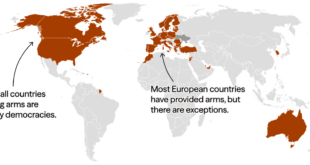Russia took aim Sunday at Western military supplies for Ukraine, launching airstrikes on Kyiv that it claimed destroyed tanks donated from abroad, as Vladimir Putin warned that any Western deliveries of longer-range rocket systems would prompt Moscow to hit “objects that we haven’t yet struck.”
The Russian leader’s cryptic threat of military escalation did not specify what the new targets might be. It came days after the United States announced plans to deliver $700 million of security assistance for Ukraine that includes four precision-guided, medium-range rocket systems, as well as helicopters, Javelin anti-tank systems, radars, tactical vehicles and more.
Military analysts say Russia hopes to overrun Ukraine’s embattled eastern industrial Donbas region, where Russia-backed separatists have fought the Ukrainian government since 2014, before the arrival of any U.S. weapons that might turn the tide. The Pentagon said last week that it will take at least three weeks to get the U.S. weapons onto the battlefield.
Ukraine said the missiles aimed at the capital hit a train repair shop. Elsewhere, Russian airstrikes in the eastern city of Druzhkivka destroyed buildings and left at least one person dead, a Ukrainian official said. Residents described waking to the sound of missile strikes, with rubble and glass falling down around them.
“It was like in a horror movie,” Svitlana Romashkina said.
The Russian Defense Ministry said air-launched precision missiles were used to destroy workshops in the Donetsk region of eastern Ukraine, including in Druzhkivka, that were repairing damaged Ukrainian military equipment.
Meanwhile, Ukraine’s General Staff said Russian forces fired five X-22 cruise missiles from the Caspian Sea toward Kyiv, and one was destroyed by air defenses. Four other missiles hit “infrastructure facilities,” but Ukraine said there were no casualties.
Nuclear plant operator Energoatom said one cruise missile buzzed close to the Pivdennoukrainsk nuclear plant, 350 kilometers (220 miles) to the south, seemingly on its way to Kyiv. It warned of the possibility of a nuclear catastrophe if even one missile fragment had hit the facility.
The missiles that struck Kyiv destroyed T-72 tanks supplied by Eastern European countries and other armored vehicles, the Russian Defense Ministry said on the Telegram app.
Ukraine’s railway authority subsequently led reporters on a guided tour of a rail car repair plant in eastern Kyiv that it said was hit by four missiles. The authority said no military equipment had been stored there, and Associated Press reporters saw no remnants of any in the facility’s destroyed building.
“There were no tanks, and you can just be witness to this.” said Serhiy Leshchenko, an adviser to the Ukrainian president’s office.
However, a government adviser said on national TV that military infrastructure also was targeted. AP reporters saw a building burning in an area near the destroyed rail car plant. Two residents of that district said the warehouse-type structure that billowed smoke was part of a tank-repair facility. Police blocking access to the site told an AP reporter that military authorities had banned the taking of images there.
In a television interview that aired Sunday, Putin lashed out at Western deliveries of weapons to Ukraine, saying they aim to prolong the war.
“All this fuss around additional deliveries of weapons, in my opinion, has only one goal: to drag out the armed conflict as much as possible,” Putin said. He insisted such supplies were unlikely to change the military situation for Ukraine’s government, which he said was merely making up for losses of similar rockets.
If Kyiv gets longer-range rockets, he added, Moscow will “draw appropriate conclusions and use our means of destruction, which we have plenty of, in order to strike at those objects that we haven’t yet struck.”
The U.S. has stopped short of offering Ukraine longer-range weapons that could fire deep into Russia. But the four medium-range High Mobility Artillery Rocket Systems in the security package include launchers on wheels that allow troops to strike a target and then quickly move away — which could be useful against Russian artillery on the battlefield.
Moscow also accused the West on Sunday of closing off lines of communication by forcing Foreign Minister Sergey Lavrov’s plane to cancel a trip to Serbia for talks Monday.
Serbia’s neighbors closed their airspace to Lavrov’s plane, ministry spokeswoman Maria Zakharova told Italian television in comments reported by Russian news agencies. Earlier in the day, Serbian newspaper Vecernje Novosti had said that Bulgaria, North Macedonia and Montenegro would not allow Lavrov’s plane to come through.
“This is another closed channel of communication,” Zakharova said.
The Spanish daily El Pais reported Sunday that Spain planned to supply anti-aircraft missiles and up to 40 Leopard 2 A4 battle tanks to Ukraine. Spain’s Ministry of Defense did not comment on the report.
Before Sunday’s early morning attack, Kyiv had not faced any such Russian airstrikes since the April 28 visit of U.N. Secretary-General António Guterres. The attack triggered air-raid alarms and showed that Russia still had the capability and willingness to hit at Ukraine’s heart, despite refocusing its efforts to capture Ukrainian territory in the east.
In recent days, Russian forces have focused on capturing Ukraine’s eastern cities of Sievierodonetsk and Lysychansk. On Sunday they continued their push, with missile and airstrikes on cities and villages in the Donbas.
In the cities of Sloviansk and Bakhmut, cars and military vehicles were seen speeding into town from the direction of the front line. Dozens of military doctors and paramedic ambulances worked to evacuate civilians and Ukrainian servicemen, and a hospital was busy treating the injured, many hurt by artillery shelling.
The U.K. military said in its daily intelligence update that Ukrainian counterattacks in Sieverodonetsk were “likely blunting the operational momentum Russian forces previously gained through concentrating combat units and firepower.” Russian forces previously had been making a string of advances in the city, but Ukrainian fighters have pushed back in recent days.
The statement also said Russia’s military was partly relying on reserve forces of Luhansk separatists.
“These troops are poorly equipped and trained, and lack heavy equipment in comparison to regular Russian units,” the intelligence update said, adding that the move “indicates a desire to limit casualties suffered by regular Russian forces.”
Both sides in the conflict have been waging an information war, especially on television, along with military attacks. Russia’s Tass news agency reported Sunday that Ukrainian forces had knocked out broadcast TV service in Donetsk, where it said a broadcast tower had toppled. Ukrainian authorities did not immediately confirm the attack.
In the Azov Sea port of Mariupol, which Russia claimed to have captured in May following a brutal monthslong siege, a mayoral aide said water supplies contaminated by decomposing corpses and garbage were causing dysentery and posing a threat of cholera and other diseases.
In remarks carried by Ukraine’s Unian news agency, Petro Andriushchenko said Russian authorities controlling the city have imposed a quarantine. He did not describe what measures Russian authorities had included, and his report could not be independently confirmed.
World Health Organization officials warned last month about the threat of cholera and other infectious diseases in Mariupol.
Also Sunday, Ukrainian President Volodymyr Zelenskyy traveled to the Zaporizhzhia region in the southeast, which is partly under Russian control. He received a battle report, thanked troops and met with refugees in what was only his second public visit outside the Kyiv area since the war began.
Far from the battlefield, Ukraine’s national soccer players missed out on qualifying for a World Cup spot, losing 1-0 to Wales in an emotionally charged match in Cardiff. Back home, some Ukrainians gathered in bars to watch the game.
 Eurasia Press & News
Eurasia Press & News


